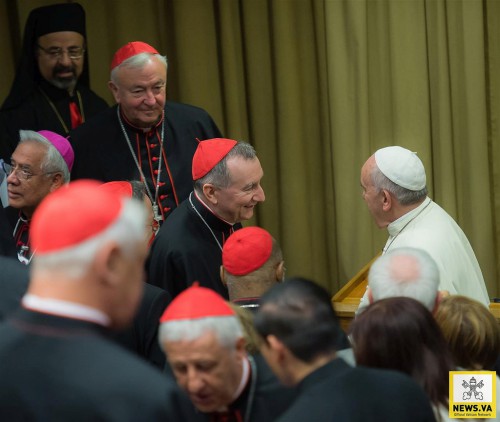
I often tell people that I consider myself accredited, first and foremost, to a global network, the most extensive on the planet. In a world that operates no longer through blocs but networks, that of the Holy See reaches parts that political, diplomatic or ordinary civil society networks simply cannot reach. For a diplomat based at the Vatican, that represents an extraordinary resource; for information about, understanding of, and access to the wider world. This was demonstrated by two recent events here in Rome.
The first was the sitting of the Extraordinary Synod on the Family, summoned by Pope Francis. Present were over 180 voting delegates, as well as religious and lay experts from all corners of the world. Inaccurately, I recognise, I like sometimes to call the Synod the “parliament” of the Catholic Church. And it is a genuinely global assembly. Bishops from every continent debated the key issues affecting the family, and it was striking how they brought with them into the Synod Hall the different cultural spaces in which they operate: Africans reminding us not to forget issues like polygamy; Asians speaking about the impact of emigration on their communities; Middle Eastern Patriarchs talking passionately about how war and conflict damage family life; Europeans relaying the concerns from their societies about divorce or same sex marriage. There was a common theme – the family – but each representative had something of their own to contribute, and the echoes of their own lands were audible throughout the fortnight.
This week, I attended the inauguration of the Academic Year of the “Urbanianum”, the Pontifical University established in the 17th century to prepare priests for mission overseas. Today, its role is as a university for seminarians, religious and priests from around the world, particularly Africa, Asia and Latin America. As I looked around the Aula Magna, re-named after Benedict XVI, I saw amongst the 450 guests a microcosm of the 110 different countries present amongst the university’s student body. A choir began proceedings singing in one of the many languages of the Democratic Republic of Congo; we heard prayers in Chinese, Hindi and Swahili (as well as English and Italian); we were informed about the 24 trips out of Italy made by Pope Benedict XVI in his 8 year Pontificate; student prize-winners came from China, India and South Africa.
I have no doubt that many of the future leaders of the Catholic church are now studying at the Urbanianum, inspired by the example of the first Pope from the New World. The global Holy See network offers us another facet of the phenomenon of globalisation, as well as being a factor in it. The people who belong to it make it an increasingly global player.
